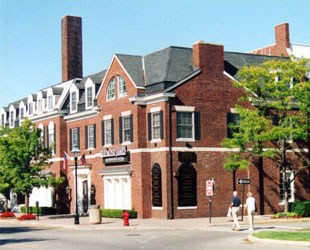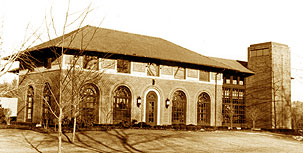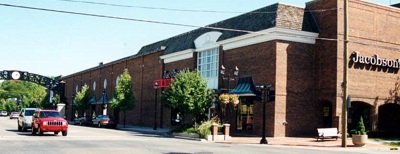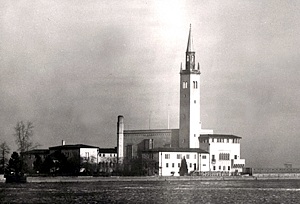|
Changes Through the 1980s and Early 1990s: Though closely tied to Detroit, the Grosse Pointes were becoming increasingly independent by the 1980s. Developers continued to acquire land for homes. The area's first gated townhouse community replaced the Chapin/ Ford estate in 1983. House prices soared, and commercial districts -- especially in Grosse Pointe Park -- were modernized. With the closing of family businesses such as McCourt Shoe Store (1988) and Hamlin’s Grocery (1990), chains and specialty shops appeared including Laura Ashley (1988) and Walden Books (1989) in The Village. On The Hill in 1987, Brooks Brothers opened a store in what had once been the Hawthorne House restaurant just as the 19861987 development of office complexes at the new Kercheval Center and renovated Punch and Judy Theater Building were being finished. The 1991 completion of St. John Hospital's Pointe Plaza stimulated commerce along Mack Avenue. On The Hill in 1987, Brooks Brothers opened a store in what had once been the Hawthorne House restaurant just as the 19861987 development of office complexes at the new Kercheval Center and renovated Punch and Judy Theater Building were being finished. The 1991 completion of St. John Hospital's Pointe Plaza stimulated commerce along Mack Avenue.
Though population between 1980 and 1990 decreased by more than 3,000, local cultural groups flourished. Grosse Pointe Theatre purchased the building at 315 Fisher for rehearsal and workshop space. The Grosse Pointe Historical Society, which became active in 1980, emphasized historic preservation; Grosse Pointe Cable TV programs highlighted community activities. Social services, however, took on a more regional character. Cottage Hospital affiliated with Henry Ford Health Care System in 1986 and Services for Older Citizens, begun in 1978 as Seniors Onward for Change (SOC), served both Grosse Pointe and Harper Woods. In 1986 the Children's Home of Detroit celebrated its Sesquicentennial--a year before the State of Michigan. When Family Life Education Council closed in 1990, its Youth Services were taken over by the Children's Home.
During this period local governments also made major changes. Construction projects included the Shores' 1984 Village Hall renovation and the Woods' 1991 Community Center addition. Resident services were enhanced through computerization of records and the 1988 implementation of 911 Emergency Service. While the City, in 1984, approved its first post-Prohibition liquor sale by the glass, the Farms, in 1985, made teen drinking a parental responsibility and, in 1989, rejected a Grosse Pointe War Memorial liquor license. Newly formed civic foundations funded Lake Shore Road beautification in 1986, Farms Pier improvements in 1983 and 1990 as well as Windmill Pointe Park renovations in 1991. After EPA violations in 1988-1989 shut down the Pointes' regional incinerator, new solutions were sought. Using findings of Grosse Pointe Citizens for Recycling, which was established in 1988, all the municipalities initiated curbside collection of recyclables by 1991. Resident services were enhanced through computerization of records and the 1988 implementation of 911 Emergency Service. While the City, in 1984, approved its first post-Prohibition liquor sale by the glass, the Farms, in 1985, made teen drinking a parental responsibility and, in 1989, rejected a Grosse Pointe War Memorial liquor license. Newly formed civic foundations funded Lake Shore Road beautification in 1986, Farms Pier improvements in 1983 and 1990 as well as Windmill Pointe Park renovations in 1991. After EPA violations in 1988-1989 shut down the Pointes' regional incinerator, new solutions were sought. Using findings of Grosse Pointe Citizens for Recycling, which was established in 1988, all the municipalities initiated curbside collection of recyclables by 1991.
Citizens continued to be active locally. They successfully countered a 1984 School Board Recall by opponents of school closings. They endorsed the 1985 War Memorial dedication of a plaque honoring veterans of the Vietnam War (primarily 1964-1973). Their support of 1990-1991 Desert Storm troops was symbolized by a community-wide proliferation of yellow ribbon bows. Citing cost and location, voters, in 1987 and 1991, rejected a proposed Grosse Pointe Public Library expansion. Equally upset by an expected addition to Detroit City Airport in 1990, they formed Citizens Against Airport Expansion.
Toward a New Millennium: Grosse Pointe City and Grosse Pointe Farms celebrated their 100th birthday in 1993 with a parade and special events. Citizens, appointed from the five Pointes, St. Clair Shores and Harper Woods, met to discuss their communities' future--probable needs, potential solutions and possible interrelationships. In June 1994, they submitted their conclusions in The Spirit of Cooperation, A Report on the Future.
Improvements to local infrastructure became a necessity. In 1993, Grosse Pointe City workers expanded into a renovated home next to their existing offices. In 1994, the Grosse Pointe Public Library became independent of the Grosse Pointe School System. As part of a 1995 municipal building renovation Grosse Pointe Park took over a neighboring, former Jefferson Avenue Chevrolet dealership. Between 1992 and 1999, all the Pointes completed separation of sewage and waste water pipes. In the Shores, lakeside homes with septic tanks had to connect to the local sewer system. A new Milk River basin and drain were constructed beginning in 1992, and in 1998 Grosse Pointe Farms upgraded its Chalfonte Sewage Plant. Community parks, which for the first time had to pay property taxes in 2000, received improved entrances, pool facilities and other amenities.

New businesses included the 1995 takeover of Perry Drugs by Rite Aid on The Hill and the 1998 opening of Farmer Jack's Food Emporium on Mack Avenue. The community-owned Grosse Pointe Cable moved into a new War Memorial studio the year before its profitable 1994 sale to Comcast. Grosse Pointe Farms used part of its proceeds to acquire the southwest corner of Mack and Moross for future redevelopment. Large properties like the Morrison and Deming estates continued to be subdivided. In 1996 a major Grosse Pointe Park condominium development was completed on Jefferson Avenue. In The Village, Caribou Coffee replaced Sanders in 1995, Borders Book Store took over Jacobson's Home Store in 1998 and a new street scape including the Valenti Memorial Clock emerged in 2000 - 2001.
 1999 was a particularly eventful year. Grosse Pointe Farms created the region's first Historic District Ordinance and Commission. Grosse Pointe Shores' Neighbors Concerned about Yacht Club Expansion halted a major addition to the Grosse Pointe Yacht Club harbor. This was followed by a resident veto of an expanded Osius Park Activities Center. Bon Secours and Cottage Hospital continued a merger of services begun in September 1998. On July 23rd, a giant wind storm uprooted trees, damaged buildings and caused several deaths. In September, Barnes School reopened as a special education pre-school. 1999 was a particularly eventful year. Grosse Pointe Farms created the region's first Historic District Ordinance and Commission. Grosse Pointe Shores' Neighbors Concerned about Yacht Club Expansion halted a major addition to the Grosse Pointe Yacht Club harbor. This was followed by a resident veto of an expanded Osius Park Activities Center. Bon Secours and Cottage Hospital continued a merger of services begun in September 1998. On July 23rd, a giant wind storm uprooted trees, damaged buildings and caused several deaths. In September, Barnes School reopened as a special education pre-school.
Anticipating the 21st Century: Between 1990 and 2000 Grosse Pointe’s population decreased by less than two percent. Having survived Y2K, the community seemed to be stabilizing even though it was faced with a vulnerable national economy, decreased state support for schools and the lowest lake levels in more than 60 years. Despite the sobering effect of the September 11, 2001 New York and Washington D.C. terrorist attacks and subsequent conflicts, there was new construction on The Hill, a proposed Regional Recreation Commission and the opening of the Grosse Pointe Artists Association Gallery on Maryland and Jefferson. Connection of the two Schools Center buildings was begun and plans for new Grosse Pointe Woods and Grosse Pointe Park Branch Libraries were approved. As always, Grosse Pointers continued to seek new technologies, improve regional services and expand citizen participation to sustain their contemporary life style in a traditional setting.
|



